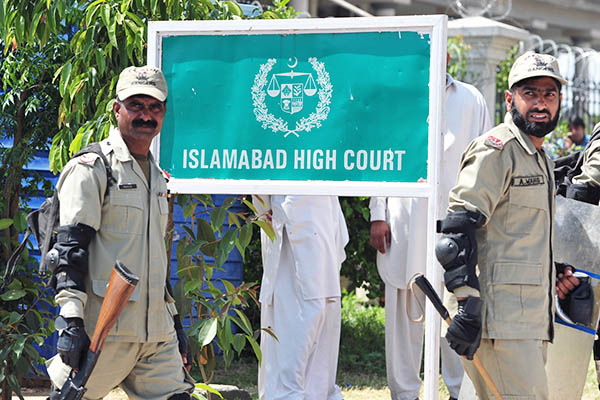
Farooq Naeem—AFP
The Islamabad High Court (IHC) on Sunday directed the federal government to serves notice to former president Pervez Musharraf—as well as his successors, including all former and the current prime minister—over their “undeclared tacit approval of the policy regarding enforced disappearances.”
In a 15-page order, issued in the case of missing journalist Mudassir Naru and five other persons, IHC Chief Justice Athar Minallah stressed that not only Pakistanis, but also non-Pakistani citizens enjoyed the fundamental right of security and protection of life. However, he regretted, reports submitted on behalf of the Commission of Inquiry on Enforced Disappearances proved that not only were enforced disappearances a reality, but were conducted with impunity to an extent that prevented anyone from being held accountable.
“It has, prima facie, become obvious that the Commission, rather than achieving its object, has become a forum which contributes toward making the agony and pain of the victims more profound. Its proceedings seem to have become a mere formality and its adversarial nature undermines and violates the dignity of the loved ones,” it added.
The court also observed that it was alarming that the federal government did not appear to have maintained the record and report of an earlier commission headed by Justice (retd.) Kamal Mansoor Alam. A report compiled by the Federal Taskforce on Missing Persons, as well as its recommendations, also appear to have been ignored, it added.
“In a nutshell, while the existence of the grave phenomenon of ‘enforced disappearance’ and impunity against it has never been denied, the federal government has so far failed to dispel the impression that it is an undeclared policy of the state,” it said, emphasizing that this was “intolerable,” especially as overwhelming evidence indicates it has remained, and continues to be, an “undeclared tacit policy of the state.”
The ruling dismisses the perception that enforce disappearances are the responsibility of the security establishment—primarily the armed forces—claiming they cannot, under the Constitution, act on their own and it was the federal government’s responsibility to oversee them. “It is the duty of the federal government, i.e the prime minister and members of the cabinet, to ensure that the constitutional scheme is not violated,” reads the order. “The buck stops with the federal government and it is solely to be held accountable for any subversive act or omission of the armed forces,” it added.
Referring to Musharraf’s tenure as president, the court noted that he had candidly referred to enforced disappearances as an undeclared policy of the state. “It is an undeniable fact that Gen. (retd.) Pervez Musharraf, who had taken over the reins of power after abrogating the Constitution and, thereafter, had ruled the country as its chief executive for almost a decade, has candidly conceded in his autobiography In the Line of Fire that ‘enforced disappearances’ was an undeclared policy of the State,” read the order.
Fixing the next date of hearing for June 17, the court directed the federal government to either produce the missing persons before it or justify the failure of the state to effectively investigate and trace their whereabouts. It said that all former chief executives should also submit their respective affidavits once notices had been issued to them.
In those affidavits, the court said, they should explain why the court should not order proceedings against them for alleged subversion of the Constitution in the context of the undeclared tacit approval of the policy regarding enforced disappearances. “The onus is on each chief executive to rebut the presumption and to explain why they may not be tried for the offense of high treason,” it said.
If the missing persons are not recovered, or effective and demonstrable actions taken by the federal government for their recovery, the court said, then the current and former ministers of the interior should appear in person to explain why the petitions should not be decided. “The learned attorney-general shall satisfy the court that in case of alleged disappearances in future why criminal cases may not be ordered to be registered against the chief executives of the federation and the concerned provinces,” it added.
On Monday, the Interior Ministry announced that the federal cabinet had approved the constitution of a committee to deliberate on a policy regarding enforced disappearances. Comprising Law Minister Azam Nazeer Tarar; Interior Minister Rana Sanaullah; Poverty Alleviation Minister Shazia Marri; Communications Minister Asad Mahmood; Defense Production Minister Muhammad Israr Tareen; Maritime Affairs Minister Faisal Subzwari; and Science and Technology Minister Agha Hassan Baloch, the committee has been tasked with submitting a report to the cabinet for deliberations.
